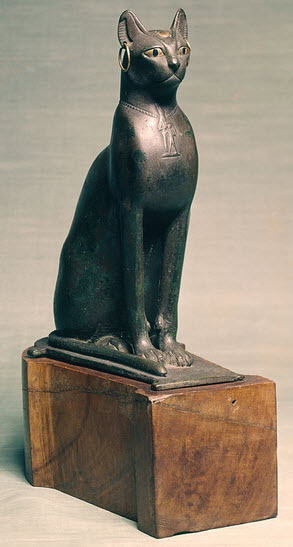
“Egyptian – Statue of a Seated Cat – Walters 54403 – Three Quarter” by Anonymous (Egypt) – Walters Art Museum. Licensed under Public Domain via Wikimedia Commons.
The history of cats tells us the one thing we know about them for sure… they really don’t need us! And they seem to like to remind us of that, don’t they!?
Was there ever a time when cats were not a part of our lives? Indeed!
It was the advent of agriculture that brought our furry little friends into our lives. Sounds strange, I know, but with agriculture came grain storage and with that came rodents. Getting the picture?
In the history of cats, it was rodents that attracted cats and they set up housekeeping near humans for that reason (and that reason only). Well, at least at first. Far be it from me to ever say cats don’t love us. They just do so in their own way.
First in the history of cats
Agriculture was first practiced in the Middle East within the range of the African wild cat, Felis libyca. At least that’s what history would tell us.
African wild cats are somewhat larger that our modern house cats and are yellow in color with muted stripes. They have a docile, almost laid back nature. Interestingly, these cats still tend to live and hunt near human dwellings today. Locals still like to catch and rear young wild cats as pets. When mature, wild cats raised by humans tend to behave very much like our familiar house cats. A very good case can (and has) been advanced designating Felis libyca as the principal founding population for domestic cats.
There are at least two other varieties of wild cat speculated to have contributed to the genetic pool of domestic cats. One is Felis Silvestris. The European wildcat who appears to have contributed darker markings and a peppery spirit to the African wild cat base. Also, from Asia, comes the Pallas or Steppe cat (Felis manul) that appears to have contributed long-haired coats to the mix.
History of Cats circa 6000 BC
The early period of domestication of cats is vague with only patches of evidence. However, by 6,000 B.C. statues found in Anatolia (modern Turkey) show women playing with domestic cats. Cats had clearly become common and affectionate pets by that time.
History of Cats circa 4000 BC
The earliest written records about cats appear by approximately 4,000 B.C. in Egypt where they were frequently kept to hunt mice and rats from stored grains. It was a good time to be a cat in ancient Egypt.
Romans spread the domestic cat northward into central Europe and westward to Britain during the expansion of their empire. Cats were quickly adopted and admired as great hunters. And they continued to move north and east in Europe. The Vikings used cats as both rodent hunters and pets.
The History of Cats in Mythology
Domestic cats were thought to be the embodiment of the goddess Bast (or Bastet). There was a necropolis at her principal temple at Bubastis that contained mummified cats.
The Viking goddess of love and war, Freyja, was associated with cats. Huge winged cats drew her chariot. It also became the custom to give new brides a kitten in her name.
In the Middle Ages cats were said to be witches familiars, in league with the devil. Because of this superstition, cats were routinely killed during festivals. Sometimes they were even burned alive or thrown off tall buildings. The Europeans paid heavily for their cruelty to cats. The deaths of so many cats allowed the rodent population to rise out of control, bringing in the Black Death which killed so much of the European population.
Eventually, the cats’ cleanly ways and hunting prowess redeemed them in the eyes of the people of Europe. By the 1600s, people in France began putting little holes near the bottom of their doors to allow their cats to enter and leave as they please.
In Asia cats continued to be familiar hunters and cherished pets. Cats were often subjects for drawing and painting in China. In Japan, cats in the form of Maneki Neko, usually portrayed as a sitting cat with one paw raised and bent, are considered good fortune. They are often found in businesses to draw in money.
The history of cats is a fascinating one, worthy of much more in depth study. It fosters an appreciation for the personalities and talents of our pets.
[xyz-ihs snippet=”Signoff1″]
